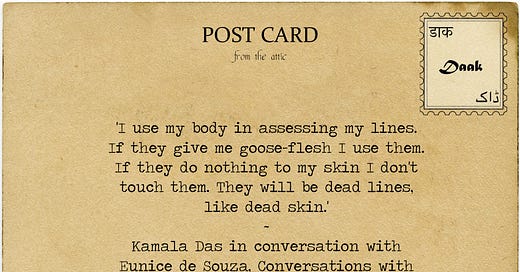Dead Lines and Dead Skin: Kamala Das in Conversation with Eunice de Souza
The best, and perhaps most frustrating aspect of Literature is that the writer’s intent is not immediately clear. We read literary works as standalone creations, divorced from their origins and creators. Any insight into the mind and creative process of a writer then feels like a rare privilege. Eunice de Souza, beloved Indian poet, columnist and teacher, gave us this singular opportunity in her book, Conversations with Poets, which contains her interviews with renowned Indian poets like Nissim Ezekiel, Arun Kolatkar and Kamala Das.
Her conversation with Kamala Das, the grand dame of Indian English poetry, is particularly interesting, as Das provides insight into her own life and writings. In her typical no holds barred style, she tackles sensitive topics like her upbringing, a complicated marriage, even affairs, but most importantly, her views on a writer’s role in society. As a writer who was often criticised for adopting a confessional style, Das argues that the wellspring of creativity and authenticity lies in one’s own lived experiences.
“When I write about other people, I don't feel fulfilled as a writer. I don't find my face floating above the words. I could be clever like a carpenter who knows fretwork but cleverness was never my motive. I categorise people as people/clever people. Cleverness is not part of the human being. It's something you acquire. You don't write to impress an audience, but to get it out.”
It comes no surprise then that her test of authenticity is also based on a primal and physical reaction to words, arguably something one cannot control or manipulate.
“I use my body in assessing my lines. If they give me goose-flesh I use them. If they do nothing to my skin I don't touch them. They will be dead lines, like dead skin.”
She also touches upon the humanness in lore and mythology that inspires her writing. In particular, she explains her fascination with the character of Radha.
“I love the character Radha…I always think of her waiting for him who never came back. I don't think any love is completely reciprocated. In one of my stories Radha smeared sandalwood paste on her breasts. She fell asleep, and when she woke up, he still hadn't come and the sandalwood paste was dry. She felt it was such a waste of sandalwood. I understand her. I see her as a human being.”
Another interesting aspect of this conversation is Das’ candid reflection on a past self that composed her earlier works, helping us trace her journey and evolution as a writer.
“It's the artist's freedom to deepen the colour. I must have been a very bold young woman. I've been through so many avatars. I can barely remember the person who wrote those passionate poems. Sex I've forgotten. I don't need it. How can I talk about it? It's all of no consequence now. I wrote the book because I thought I was on my deathbed. I needed to be remembered as one who lived a spectacular life.”
Finally, we leave you with Das’ modus operandi ― a philosophy that guides both her writing as well as her personal life.
“The loftier you get, the more artificial the poetry.”



